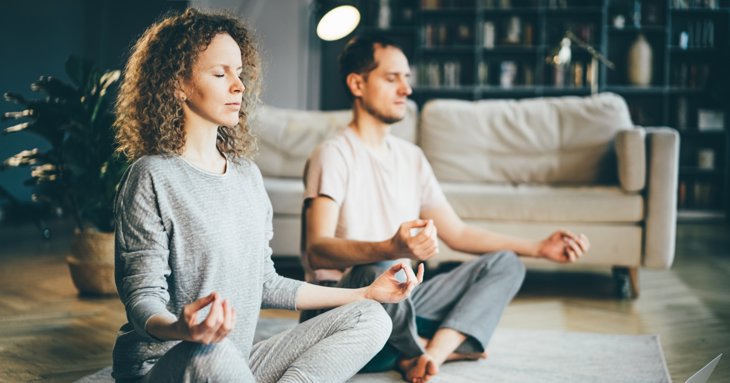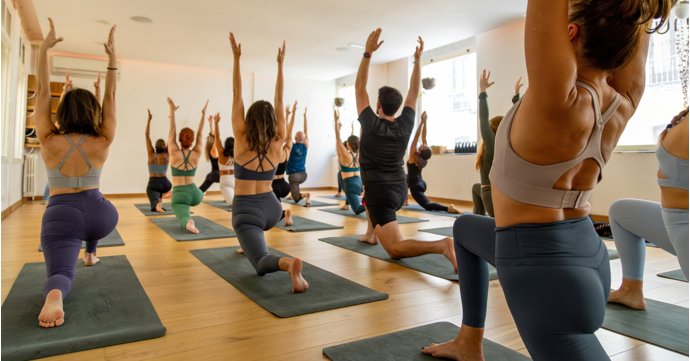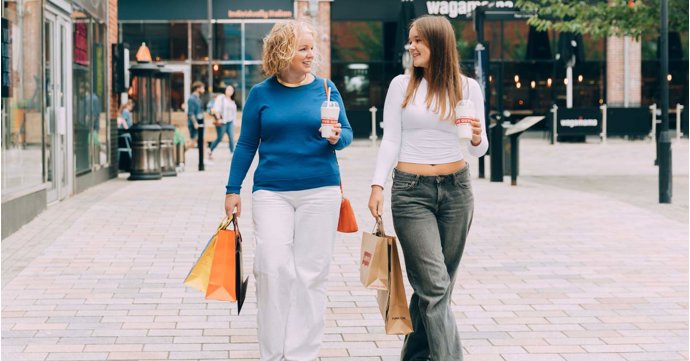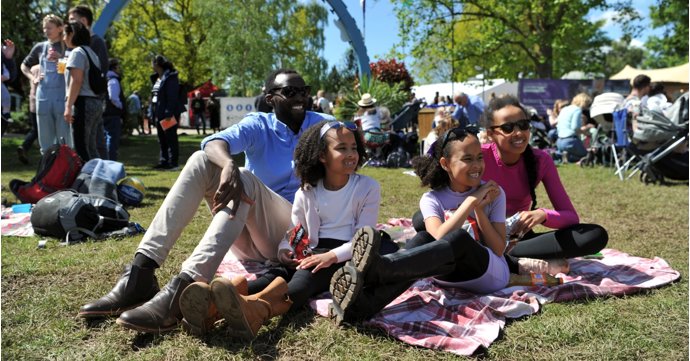Living through the Coronavirus pandemic is a new, unprecedented and uncertain experience for us all. SoGlos spoke to The Isbourne in Cheltenham to find out how mindfulness and meditation could help people manage anxiety at home and at work during the lockdown.
About the expert – Kathryn Buxton from The Isbourne
The Isbourne in Cheltenham is a wellbeing hub for the south west, providing mindfulness and spiritual development through courses, workshops and talks, as well as educational courses in holistic therapy. It has also recently launched an online care package for key workers to help reduce anxiety during lockdown.
As well as managing Isbourne College, Kathryn Buxton is a qualified mindfulness and meditation instructor who has been teaching a variety of classes and workshops at The Isbourne for over five years. She also teaches accredited courses in holistic learning, specialising in mediation and the ego.
For more information on the online care package for key workers, visit isbourne.org.
With the current Coronavirus situation, lots of people are experiencing stress and anxiety right now. What does that do to your body?
Stress and anxiety are alright for the body in very short spurts. When we’re faced with a challenge, there’ll be a burst of adrenaline and cortisol that triggers our fight or flight response. You notice this in the animal kingdom, so if an antelope is being chased by a lion, it will have a burst of adrenaline that allows it to run off, but after that, the animal’s anxiety levels come right back down and that adrenaline and cortisol is dispersed throughout the body.
For us humans, we’re not being chased by lions, but we are living in this bubble where our anxiety levels are increased because we don’t know what’s going to be happening and that can make us fearful. The levels of adrenaline and cortisol in our bodies aren’t being allowed to come back down to a normal level, which can cause inflammation in the body, which in turn can cause all sorts of health problems, so it’s not good for us to feel constantly anxious or constantly stressed.
What are some practical things people can do to try and manage their anxiety levels in our current situation?
There’s two important key points. The first thing to do is to be excessively kind to yourself. These are difficult times and you are going to feel anxious. You’re the same as everybody else in this situation, everyone else is worried too, so don’t beat yourself up about feeling anxious or stressed. It’s a perfectly natural response to what we’re going through.
What we’re experiencing right now is a trauma. For some of us that will be low level, for others it will be more, but it’s traumatic for everyone because there’s an awful lot of change and we have very little control over that. As a species, we don’t like change, we like to feel like we’re in control. At the moment all of our routines have been thrown into the air, we’re having to adapt to different circumstances and the biggest problem is that we don’t know when or how it’s going to end. Naturally we’re going to feel anxious about this, but we make that worse when we’re worried about being anxious. We just need to give ourselves a little bit of slack, and that will really help.
The second thing to take from this is that we, as humans, are a highly adaptable species. We have been through traumatic things before in our history and we’ve come out of it. We’re the most adaptable species on the planet and we can get through this. On a personal level, think about things in your own life that have been difficult or traumatic, and remember that you got through that. So be kind to yourself and remind yourself that you can get through this too.
When anxiety hits, is there anything specific that you can do in the moment to help?
If your anxiety is becoming overwhelming in the moment, you end up in your head. Your mind is going a million miles an hour and building up all sorts of anxious scenarios that lead you down a deep, dark rabbit hole.
Because we’re in the mind, we need to get back into the body, so if you find yourself feeling overwhelmed, first take in three things that you can see. Look around and say out loud three things that you can see, then think about and say out loud three things that you can hear. Then go to your sense of smell, think about what you can smell. You might not be able to smell anything straight away, but just give yourself some time to really think about something you can smell. It might be outside, so maybe flowers or cut grass, if you’re inside it might be the smell of coffee brewing, it doesn’t matter what it is you can smell, the fact that you’re doing it is taking you away from being stuck inside your mind. Next, think about what you can feel. How do your feet feel on the ground? If you can, especially if you’re outside, take your shoes and socks off and actually experience what the ground feels like on the soles of your feet.
Another thing you can do is to take three deep breaths in and a long, slow breath out through the mouth, for 10 to 15 seconds. Taking those deep breaths in gives a signal to the body that you can relax. Overcoming anxiety in the moment is all about bringing you out of your mind and brining your awareness back into your body so both of these will really help.
Nobody is quite sure how long the current restrictions are going to continue for. Are there any specific things people can do to try and manage longer term lockdown anxiety?
Connectedness is particularly important at the moment. Human beings are very, very social and we need to feel connected to people. Just having somebody you can talk to, whether that’s someone you live with, or if you live on your own, someone you can connect with over Zoom or Skype is really important.
You also need to factor in some time for yourself during the day too. Depending on your situation this might be difficult, if you’re trying to look after kids and hold down a job for example, but do try to find a little bit of time to do something for yourself. Have a warm bath, listen to your favourite podcast, do things that feel good for you and nurture you, even if it’s just reading a book.
If you are living with other people and that’s becoming difficult, make sure you keep communications open about everything from doing the washing up to who’s using the bathroom when, to relieve any tensions.
Going out into nature is just the best. We’re very lucky where we live in Gloucestershire that we’ve got so many beautiful places we can go for walks, so getting out and spending some time enjoying being in nature is great. Getting exercise is important, but it’s not about feeling the pressure to hare round the park in 30 minutes to get it done. Enjoy it, savour it, notice the plants, the birds singing, getting out into nature is a real biggie.
I’d also recommend limiting looking at the news. Set yourself a time in the day, once or twice at the most to look at the news, because otherwise it can become addictive as it’s changing all the time and that will raise those anxiety levels up.
Most importantly, it really comes back to being kind to yourself. It is really difficult, what we’re going through is unprecedented, so just be gentle on yourself and don’t give yourself a hard time, you will get through this. You can even make some little affirmations to use when you start to get stressed, like ‘I’ve got this’ or ‘I know it’ll be alright.’
Lots of people seem to have trouble sleeping when they’re worried or anxious. What advice would you give people who might be struggling to get enough sleep at the moment?
Sleeping can be hard at the moment, and that’s understandable, but again try not to worry about not being able to sleep. When we wake up at three in the morning, we tend to start worrying that we’re awake and we’re not getting enough sleep, which then makes us anxious and we struggle to get back to sleep. We need to take it one day at a time, tell yourself that you can manage one day even if you haven’t had enough sleep and try not to worry.
In terms of practical tips, firstly keeping a regular bedtime routine. We do this with kids, but we also need to do it as adults, so if you can go to bed at the same time and get up at the same time every day, even at the weekend, try to get out of the habit of lying in for an extra few hours as this can disrupt your sleep pattern. Before bed, try to include things like gentle yoga stretches or having a warm bath as part of your routine.
Something I do that really helps me is I keep a journal, so before I go to bed I’ll write about my day, but at the end of each entry I will write three lovely things that have happened that day. Even if it’s something as simple as going for a walk, the sun was shining or hearing birds singing, they don’t have to be massive things, but just three nice things that have happened to me so it’s the last thing I remember as I go to sleep, and that really helps.
If you can, try to avoid screens in bed. Your brain needs to associate bed with being a place you sleep. If you’re working from home, it can be really tempting to wake up, grab the laptop and start working from bed, but if you can, try not to do that, otherwise your brain gets mixed signals and will start to associate bed with being somewhere that you do work, or watch TV. What you want is for your brain to know that this is the place you go to sleep, so it can switch off when you get into bed.
What can people do if they wake up in the night and can’t get back to sleep?
It sounds strange, but shaking out excess energy can really help, so if you can get out of bed and just shake your hands, arms, legs, you’re physically shaking out any excess energy.
I mentioned earlier about the antelope getting chased by a lion, if you watch wildlife documentaries, you’ll often see than when the antelope isn’t caught by the lion, it shakes its body to get rid of all that excess adrenaline. When we find we can’t sleep, it can be because we’ve got this excess adrenaline in our body, so standing up and literally shaking it out helps, as long as you’re not going to wake anyone else up, of course!
If you can feel that you’re just not going to get back to sleep, get out of bed if you can, go into another room and do something else, like reading a book or listening to a podcast, until you’re tired, and then return to bed. Again, it’s about training your mind that bed is a place that you go to sleep, you don’t want it to feel like a battlefield if you’re tossing and turning, fighting to get back to sleep when you can’t.
We’ve recently released an online care package for key workers, and one of the things included is a sleep story. I’ve done one about going down to the beach which is really quite nice, so listening to something like that at bedtime or just before is a really nice way to relax. It’s a good thing to listen to when you’re awake and can’t get back to sleep too, instead of staying awake worrying that you’re not sleeping and have got to go to work in the morning.
What is The Isbourne’s online care package for key workers?
It’s an experiential resource that you can access online very quickly when you get home, or when you’re on your lunch break. There are some meditations, there’s a longer sound bath, there’s a sleep story, instructions for a self-care massage, so it’s very experiential. It’s all about helping you to cope with stressful feelings and to help you relax as best as you can.
What exactly is a sound bath, and what are the benefits of something like that?
Sound baths are lovely! In a traditional sound bath setting you’d come into a venue, lie down on a yoga mat, then the person running the session would have lots of singing bowls, gongs, tuning forks and so on, which build up a sound and gentle vibrations which wash over you as you lie there with your eyes closed. It’s very, very relaxing. It’s more than just banging a few gongs too, people who run sound baths have been on courses to learn how to gradually build up the sound and bring it back down again so it’s a very pleasant, relaxing experience.
The one we include in The Isbourne’s online care package for key workers is by Jo Fellows who is an experienced sound bath practitioner. You can lie down in your bedroom, living room floor, anywhere that’s comfortable, and just listen to this experience which is really lovely.
What advice would you give to people who’ve never tried meditation before, or who are unsure if it’s for them?
The great thing about The Isbourne’s key worker package is that you can access it any time. There’s a variety of different videos on there, so just give something a go for five or 10 minutes and see how you feel. All the meditations on there are guided, so you’re not just left to your own devices, you’ll be guided through it all, so give it a try and see what works best for you.
A lot of people may be turning to meditation because of the heightened stress and anxiety that this current situation brings, but things like this can be done anytime, you don’t have to feel stressed to feel the benefits. I often say to my students to meditate when you’re not feeling stressed is like topping up your batteries. If you only go to meditation when you’re stressed it can be harder to do because your mind is whizzing around, so making meditation a regular self-care practice is really helpful. But it’s about finding what fits best for you, there isn’t a right or a wrong way to do it. If at the moment what works for you is a tub of ice cream and Netflix then do that, and don’t give yourself a hard time about it.
There’s a lot of pressure for us to use our downtime to be productive, to learn a new language or write a book or whatever, but don’t forget, we are going through a traumatic experience and we all need to cope in the best way that we can, so don’t fall into that trap. Some days it will be all you can do just to get dressed and brush your teeth, and you can celebrate that too. And the online care package for key workers is there with plenty of resources any time you do want to try something out.





















